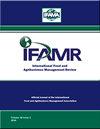The perfect match: interpersonal relationships and their impact on chain management
IF 1.5
4区 经济学
Q3 AGRICULTURAL ECONOMICS & POLICY
International Food and Agribusiness Management Review
Pub Date : 2022-03-14
DOI:10.22434/ifamr2020.0204
引用次数: 1
Abstract
Within the German wine industry, more and more wine estates engage in collaborations to secure grape and wine qualities and quantities to meet the market demands, creating vertically coordinated supply chain networks. The focus of many scholars in this field is mainly set on structural arrangements and less on relational management mechanisms, as studies of structures and their implementation are more readily undertaken and quantified. Both structural and relational mechanisms and their influence on the different levels such as network-, dyad- and firm-level are researched. In the agri-food industry, small- and medium-sized businesses, often family-led, prevail, amplifying the influence of single decision-makers on cooperative decisions. In such a setting, personal relationships and social bonds are stronger than in classical B2B relationships in other industries. Research on chain management does not, generally, take the interpersonal or individual influence of decisions-makers into account. However, recent and emerging literature indicates an influence of managers on chain management. Hence, the questions arise how do managers affect decisions and how can the interpersonal influence be managed? This paper aims to expand the theoretical framework of chain management including the impacts of behavioural and interpersonal aspects in decision-making regarding relationship management.完美匹配:人际关系及其对连锁管理的影响
在德国葡萄酒行业,越来越多的酒庄参与合作,以确保葡萄和葡萄酒的质量和数量,以满足市场需求,创建垂直协调的供应链网络。由于对结构及其实施的研究更容易进行和量化,许多学者在这一领域的重点主要放在结构安排上,而对关系管理机制的关注较少。研究了结构机制和关系机制在网络、二元和企业等不同层次上的影响。在农业食品工业中,往往由家庭主导的中小型企业占主导地位,扩大了单个决策者对合作社决策的影响。在这种情况下,个人关系和社会关系比其他行业的传统B2B关系更牢固。对连锁管理的研究通常不考虑决策者的人际或个人影响。然而,最近和新兴的文献表明管理者对连锁管理的影响。因此,出现的问题是管理者如何影响决策,以及如何管理人际影响?本文旨在扩展连锁管理的理论框架,包括行为和人际方面对关系管理决策的影响。
本文章由计算机程序翻译,如有差异,请以英文原文为准。
求助全文
约1分钟内获得全文
求助全文
来源期刊

International Food and Agribusiness Management Review
AGRICULTURAL ECONOMICS & POLICY-
CiteScore
2.90
自引率
0.00%
发文量
0
审稿时长
>12 weeks
期刊介绍:
The IFAMR is an internationally recognized catalyst for discussion and inquiry on issues related to the global food and agribusiness system. The journal provides an intellectual meeting place for industry executives, managers, scholars and practitioners interested in the effective management of agribusiness firms and organizations.
IFAMR publishes high quality, peer reviewed, scholarly articles on topics related to the practice of management in the food and agribusiness industry. The Journal provides managers, researchers and teachers a forum where they can publish and acquire research results, new ideas, applications of new knowledge, and discussions of issues important to the worldwide food and agribusiness system. The Review is published electronically on this website.
The core values of the Review are as follows: excellent academic contributions; fast, thorough, and detailed peer reviews; building human capital through the development of good writing skills in scholars and students; broad international representation among authors, editors, and reviewers; a showcase for IFAMA’s unique industry-scholar relationship, and a facilitator of international debate, networking, and research in agribusiness.
The Review welcomes scholarly articles on business, public policy, law and education pertaining to the global food system. Articles may be applied or theoretical, but must relevant to managers or management scholars studies, industry interviews, and book reviews are also welcome.
 求助内容:
求助内容: 应助结果提醒方式:
应助结果提醒方式:


